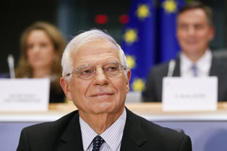
EaP: EU Commission proposes new policy objectives for Beyond 2020
By Natalia Kochiashvili
Friday, March 20
The European Commission and the High Representative of the Union for Foreign Affairs and Security Policy has put forward a proposal for the long-term policy objectives of the Eastern Partnership beyond 2020 on March 18th. The aim of policy objectives is increasing trade, strengthening connectivity and deepening economic integration with all 6 EaP countries, including Georgia, strengthening democratic institutions, the rule of law, environmental and climate resilience, and promoting fair and inclusive societies.
The proposal outlines how the EU will work together with the partner countries to tackle common challenges and strengthen their resilience in the light of today's challenges as an overriding policy objective beyond 2020.
According to the proposal, building on the achievements of the Partnership in the first 10 years, the work between the EU and partners will continue on new policy priorities to support the ecological transformation, the digital transformation and to deliver on economies that work for all.
According to the statement, the Commission and the European External Action Service expect the Member States and partner countries to endorse the proposal given the Eastern Partnership Summit that will be held in Brussels, June18, 2020. It will give a mandate to develop a new set of tangible deliverables building on the current 20 Deliverables for 2020.
Josep Borrell, High Representative said: 'Our neighbours' strength is also the European Union's strength,' explaining that the EaP remains a crucial element of the EU's foreign policy. According to the Vice-President, proposals will further strengthen partner countries, reflecting shared priorities and challenges, while maintaining the emphasis on delivering tangible, positive results for all citizens.
Commissioner for Neighbourhood and Enlargement Oliver Varhelyi noted that this is a very clear message for EaP countries, meaning that EU will help them build strong economies and create growth and jobs by attracting foreign direct investment and by strengthening connectivity in key sectors, such as transport, energy and environment. “We will work closely together to address today's challenges across the board, including the ongoing COVID-19 pandemic,” he added.
Ambassador of the European Union to Georgia Carl Hartzell said that for Georgia this means continued strong support to the economy, job creation.
In his words, the new strategy sets out new, ambitious targets for the EaP. Economic development, connectivity and job creation will remain top of the agenda, alongside support to strong democratic institutions.
“Among the novelties we find an increased emphasis on the environment and health, which I personally warmly welcome as I know that Georgia stands well prepared to profit in these areas,” he noted.
Hartzell added that mirroring the EU’s priorities, “we should be able to do more on the digital agenda, helping an advanced partner like Georgia to go further and faster in modernizing its economy and society.”
The Eastern Partnership was established in 2009 to enhance and deepen political and economic relations between the European Union, its member states and Azerbaijan, Belarus, the Republic of Moldova, Georgia, Armenia and Ukraine. Current policy objectives were defined through agenda 20 Deliverables for 2020, agreed in 2017. The new policy objectives emerged from the consultation on Eap future carried out in 2019, with participation of Member States, partner countries, civil society organizations, academics and businesses and financial institutions.


